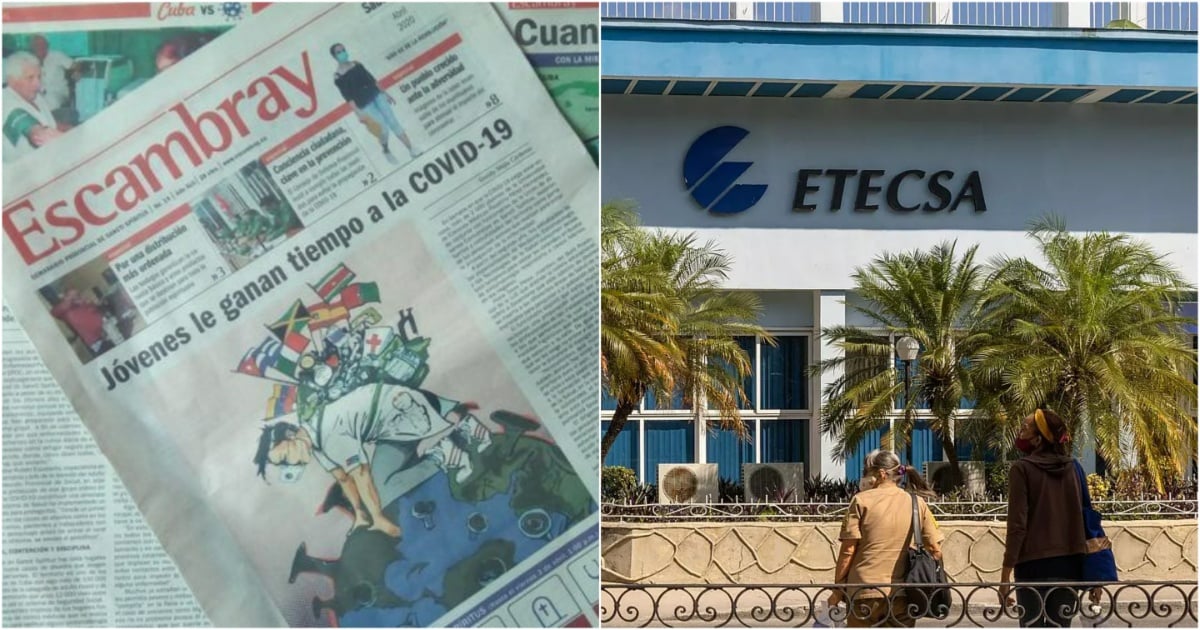An opinion piece in the pro-government media has acknowledged the failure of the recent telecommunications price hike and the state-owned monopoly ETECSA's disconnect from the everyday realities of Cuban life. "The hours spent in dialogue—and at least partial rectification—are not currently being paid for in Cuba with megabytes or data. This indicates, I believe, a positive sign, after ETECSA found itself disconnected—not from phones or the internet, but perhaps unintentionally—from the Cuban reality," begins the article by Elsa Ramos, published in the official newspaper Escambray of Sancti Spíritus.
Under the title "ETECSA Disconnects," the opinion piece suggests that the company failed to convincingly present its new "package," lacking the necessary arguments, and thus did not succeed. Ramos also draws a link between "the entity and its specialists" and "the State and Government," a connection often avoided by those close to the regime.
"What the entity and its specialists should have anticipated—and with them, the State and Government—has been proposed by thousands of Cubans using both common sense and popular logic, all from a country that has invested in education and knowledge," Ramos comments.
Criticism of Government's Communication Missteps
Furthermore, the article dismantles the regime's claim that the public discontent over the new measures is merely due to miscommunication. "It would be simpler if it were just about communication. The real issue is that, in attempting to correct an economic distortion...and in its urgent and understandable need for foreign currency, it conditioned the consumption of mobile telephony. Or did it dollarize it?" the article questions.
According to Ramos, this policy exacerbates the already significant inequalities within contemporary Cuban society. "It's not just that the new tariffs further deepen our social divides; they also restrict the usage and consumption for academics, teachers, students at all levels, doctors, remote or in-person workers, children, and even homemakers or retirees—all Cubans who need technology for development, communication, and even for entertainment to relieve our harsh daily reality," she warns.
Challenging ETECSA's Business Practices
The article further challenges the state monopoly with uncomfortable questions regarding its business practices. "Did society need to be shaken for ETECSA to sit down and evaluate what has long been a loud demand? Why does the unused balance not roll over if, by the end of the month, some don't use all they've purchased? Why can't the hours bought for Nauta Hogar that go unused due to third-party disruptions like power outages be postponed to the following month?" Ramos writes.
Ramos' piece joins an unusual editorial note from the Matanzas newspaper Girón, which last week called for more transparency and sensitivity from the state company amid the severe economic crisis affecting the population. "Connectivity is not a luxury," emphasized the text, reflecting growing pressure from various social sectors, including university students, artists, and regular users.
While the editorial justified ETECSA's need for foreign currency and echoed the regime's classic explanations regarding the "U.S. blockade," it acknowledged that the measures have sparked a massive and legitimate adverse reaction. Although discontent with the measures spans all sectors of the population, university students, in particular, have mobilized, issuing statements and calling for strikes.
Government Denial of Student Protests
Recently, official spokespersons Arleen Rodríguez Derivet and Bárbara Betancourt dismissed the student protests against the price hike, accusing independent media of spreading "textbook fake news." During the Cubadebate podcast Chapeando Bajito, the spokespersons acknowledged the student rejections and statements but claimed that "everything has been handled through institutional dialogue."
"Once again, fake news is raining down. The recent hours have been a genuine war operation, only comparable to the invasion of lies on July 11," they complained. The "dialogue, proposals, and agreements" environment described by the spokespersons contrasts sharply with viral videos circulating on social networks of frustrated students confronting officials unable to address their grievances.
The academic strike in Cuba began on June 4, spreading across universities nationwide, with its epicenter at the University of Havana. The response from leader Miguel Díaz-Canel has been clear: there will be no reversal of the tariff increases. The student movement shaking Cuban universities demands not only fairer tariffs and equitable connectivity but also broader systemic changes.
Understanding the ETECSA Controversy
What is the main criticism against ETECSA's recent policies?
The primary criticism is that ETECSA's recent price hike has disconnected it from the realities of Cuban society, exacerbating existing inequalities and limiting access to essential telecommunications services.
How have students reacted to the telecommunications price hike in Cuba?
Students in Cuba have been particularly vocal, organizing strikes and issuing statements demanding fairer tariffs and better connectivity. Their actions highlight the growing discontent with the government's policies.
What has been the response of the Cuban government to the protests?
The Cuban government, led by Miguel Díaz-Canel, has firmly stated that there will be no rollback of the tariff increases, despite widespread protests and calls for change.
